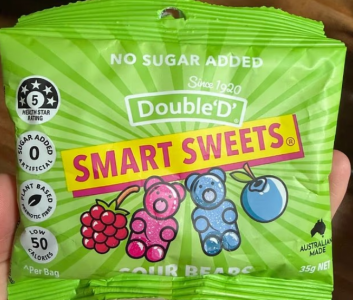You reach for what looks like an innocent bag of colourful gummies, confident you're making a healthier choice. After all, they're sugar-free, marketed as 'better for you,' and sitting pretty on the shelves at your local ALDI.
Half an hour later, you're discovering why experienced shoppers whisper warnings about these seemingly harmless treats.
Consumers have been warned about a sweet treat found in ALDI's aisles—the Double D Smart Sweets.
While these lollies are supposedly ‘sugar-free’, consumers have reported about having upset stomachs and cramps after eating the product.
The culprit? Maltitol, a sugar substitute that people looking to lose weight or manage diabetes often use, but one that can turn a simple sweet treat into an urgent bathroom situation.
What is maltitol and why is it wreaking havoc?
Maltitol is a sugar alcohol used as a sugar substitute and laxative. It has 75-90 per cent of the sweetness of sucrose. It is used to replace table sugar because it is half as calorific, does not promote tooth decay, and has a somewhat lesser effect on blood glucose.
The problem lies in how our bodies process this sweetener. Maltitol cannot be fully absorbed during digestion. Instead, when it reaches the large intestine it becomes fermented by bacteria, which can potentially cause gastro symptoms.
Australian nutritionist Rebecca Gawthorne explained the mechanism: 'Maltitol is only partially absorbed in the small intestine, meaning the rest is fermented by our gut bacteria. This can lead to gastrointestinal symptoms such as bloating, gas and even a laxative effect, especially if eaten in large amounts or frequently throughout the day.'
'Some people are more sensitive than others, so even a handful of gummies could trigger symptoms.'
The numbers that matter for you digestive peace
Research reveals some concerning thresholds. The United States Food and Drug Administration (USFDA) classifies maltitol as generally recognised as safe, and studies have found that most adults can tolerate up to 40 grams of maltitol per day without adverse side effects. However, if you have a sensitive digestive system, you may experience side effects from eating even less.
One clinical study found that as little as 40 grams of maltitol led to increased stomach gurgling and flatulence. The group given maltitol were more than twice as likely to experience these unpleasant side effects versus the group given sucrose.
To put this in perspective, a typical 35-gram bag of these sugar-free gummies could push you right to that threshold, and maltitol has a laxative effect, typically causing diarrhoea at daily consumption above about 90 grams.
Understanding sugar alcohol tolerance levels
- Adults: Up to 40g maltitol daily typically safe
- Children: Up to 15g daily recommended
- Sensitive individuals: May react to much smaller amounts
- Warning threshold: Products with 50g+ sugar alcohols must carry laxative warnings in Australia
Why seniors need to be especially cautious
As we age, our digestive systems often become more sensitive to dietary changes and additives. Sugar alcohols are typically found in foods marketed to people with diabetes, who already have an increased risk for major heart events. Recent research suggests sugar alcohols may inadvertently be adding to that cardiovascular risk.
For senior Aussies managing diabetes, this presents a particular dilemma. While these products offer lower blood sugar impact, maltitol still affects blood glucose and results in a slower rise in blood sugar and insulin levels when compared to sucrose and glucose.
It's important to discuss eating items containing maltitol with a healthcare professional and dietitian if you have diabetes. They'll be able to determine if it's the best sugar alternative for you and help you figure out the best amount to consume to avoid unpleasant side effects.
Better alternatives for your sweet tooth
If you're seeking sugar-free options, erythritol has almost no calories, doesn't raise blood sugar levels, and doesn't cause digestive issues for most people, as nearly all of it is absorbed instead of fermenting in the gut like maltitol.
When comparing maltitol vs. stevia, stevia is a natural source of sweetness that contains zero calories and has a zero on the glycaemic index scale.
Other gentler alternatives for sugar
- Monk fruit sweetener
- Small amounts of natural honey or maple syrup
- Fresh or dried fruit for sweetness
- Real sugar in moderation
Real stories and lessons
The stories that sparked this conversation reveal the reality of maltitol's effects. One described eating a full 35-gram bag of berry lollies and experiencing multiple urgent bathroom trips during work hours. Another compared their experience with sugar-free lollies to 'the most terrifying, longest, loneliest experience' of their life.
While these accounts might seem dramatic, they highlight an essential point: consuming too much maltitol at one time may cause gastrointestinal discomfort, but these effects may not be the same for everyone.
The key lesson isn't to avoid these products entirely, but to approach them with knowledge and caution.
The bottom line for Aussie customers
Maltitol's safety has been reviewed and confirmed by health authorities around the world, including Australia and Canada. The US Food and Drug Administration also declares maltitol eligible for use, and it has been shown to be well-tolerated at commonly consumed doses.
Safe consumption guidelines for sugar alcohols
- Start with small portions to test your tolerance
- Spread consumption throughout the day rather than eating large amounts at once
- Read serving size recommendations carefully
- Watch for cumulative effects from multiple sugar-alcohol products
- Consider keeping a food diary if you experience digestive issues
The issue isn't the safety of maltitol itself, but rather understanding your personal tolerance and consuming these products mindfully. For many people, a few gummies as an occasional treat pose no problems. The trouble begins when you treat a bag of sugar-free lollies the same way you might treat regular confectionery.
To avoid digestive disturbances when consuming products with artificial sweeteners, limit your consumption of processed foods, especially those marketed as 'sugar-free.' If you choose food products containing sugar-free alternatives, there are healthier options than maltitol that don't come with the potential of digestive disturbances.
Your experience matters
Have you had an unexpected encounter with sugar-free confectionery? What strategies do you use to satisfy your sweet tooth while managing health conditions? Share your experiences and tips with fellow readers—your story might help someone else avoid an uncomfortable situation or discover a better alternative that works for them.
Primary Source

Urgent warning as lollies sold at Aldi lead to grim side effect
Shoppers say the lollies have left them doubled over with cramps, sprinting for the bathroom, and in some cases describing the aftermath as 'worse than childbirth.'www.dailymail.co.uk
Maltitol: Is It a Safe Sugar Substitute?
Cited text: 'Maltitol is a sugar substitute and sugar alcohol that people looking to lose weight or manage diabetes often use. '
Excerpt: 'Maltitol, a sugar substitute that people looking to lose weight or manage diabetes often use.'

Is Maltitol a Safe Sugar Substitute?
Maltitol is a sugar substitute and sugar alcohol that people looking to lose weight or manage diabetes often use. But is it safe? www.healthline.com
www.healthline.com
Maltitol
Cited text: 'Maltitol is a sugar alcohol (a polyol) used as a sugar substitute and laxative. It has 75–90% of the sweetness of sucrose (table sugar) and nearly ide...'
Excerpt:'Maltitol is a sugar alcohol used as a sugar substitute and laxative.'

What Is Maltitol and Is It Safe? A Thorough Review for Non-Scientists | Diet vs Disease
Cited text: 'These gastrointestinal (GI) problems happen because maltitol is not completely absorbed during digestion. Instead, when it reaches the large intestine...'
Excerpt: 'Maltitol is not completely absorbed during digestion. Instead, when it reaches the large intestine it becomes fermented by bacteria, which can potentially cause gastro symptoms.'
https://www.dietvsdisease.org/what-is-maltitol-is-it-safe/
Sugar Alcohols May Not Be as Safe as You Thought
Cited text: 'These compounds are in foods that are typically marketed to people with diabetes, who already have an increased risk for major heart events. And the ...'
Excerpt: 'Sugar alcohols are typically found in foods marketed to people with diabetes, who already have an increased risk for major heart events.'
Sugar Alcohols May Not Be as Safe as You Thought
Sugar alcohols are a sugar substitute that have long been thought to be a safe part of a balanced diet. But new research shows that might not be the case. Here’s what you need to know. health.clevelandclinic.org
health.clevelandclinic.org
Maltitol: What Is It and Is It Safe for You?
Cited text: 'Erythritol: A sugar alcohol like maltitol, erythritol has almost no calories and is a commonly used sugar substitute that doesn’t raise blood sugar le...'
Excerpt: 'Erythritol has almost no calories, doesn't raise blood sugar levels, and doesn't cause digestive issues for most people, as almost all of it is absorbed instead of fermenting in the gut like maltitol.'

Maltitol: What Is It and Is It Safe for You? | Signos
Learn about the popular sugar alcohol maltitol, including how it can help reduce your sugar intake, potential benefits, side effects, and substitutes. www.signos.com
www.signos.com
Maltitol: Do the Side Effects Outweigh the Benefits?
Cited text: 'When looking at maltitol vs. stevia, for example, the latter is a natural source of sweetness that contains zero calories and has a zero on the glycaem...
Excerpt: 'When comparing maltitol vs. stevia, stevia is a natural source of sweetness that contains zero calories and has a zero on the glycaemic index scale.'
https://draxe.com/nutrition/maltitol/
What Is Maltitol?
Cited text: 'Maltitol’s safety has been reviewed and confirmed by health authorities around the world, including the World Health Organization, the European Union,...'
Excerpt: 'Maltitol's safety has been reviewed and confirmed by health authorities around the world, including Australia and Canada.'

What Is Maltitol? - IFIC
Highlights The basics of maltitol Maltitol (pronounced mall-ti-tall) is a type of carbohydrate called a sugar alcohol, or polyol, which are water-soluble compounds that occur naturally in many fruits and vegetables. Maltitol is produced from starches that are rich in the sugar maltose (a... ific.org
ific.org









